#stay curious
Text
only 31 more days until the statue of limitations is up on the designer axe story
116 notes
·
View notes
Text
i love having friends that know things. yeah just give me all your knowledge please. i've learned so much about subjects i never knew i was interested in before just from osmosis of hanging out with my friends over the years
35 notes
·
View notes
Text
carly's 13th reason.
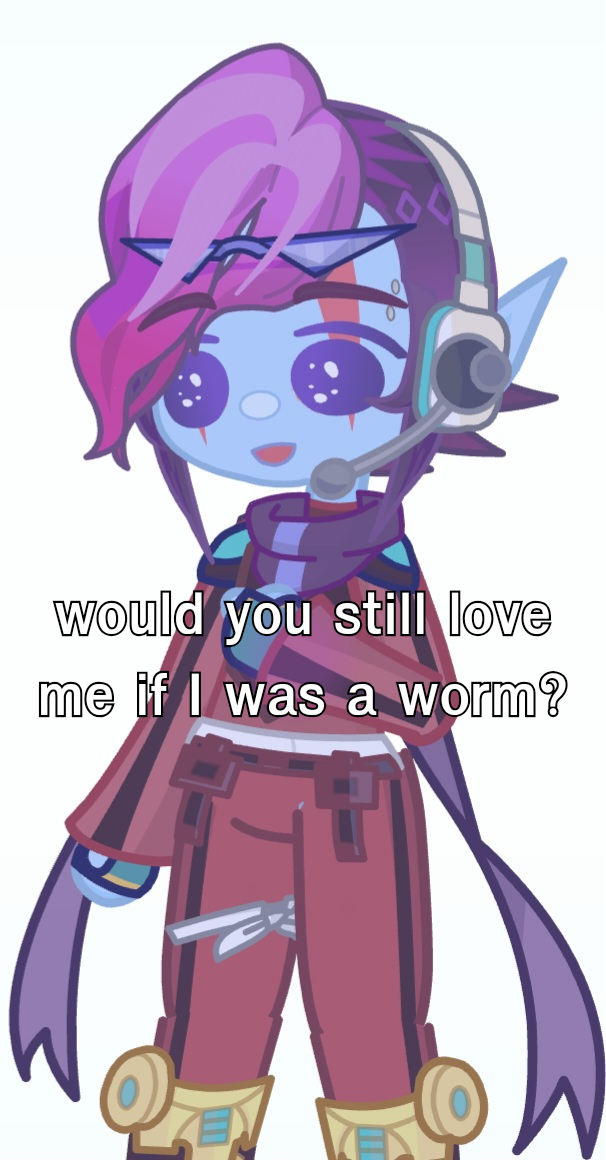


What answer did you expect from a Cecaelia? ☠️
#octobella#pj masks carly#this is so stupid#pj masks#pjm headcannons#Carly got over it...#Eventually#OR MAYBE SHE DIDNT?#STAY CURIOUS#QUESTION EVERYTHING.
17 notes
·
View notes
Text
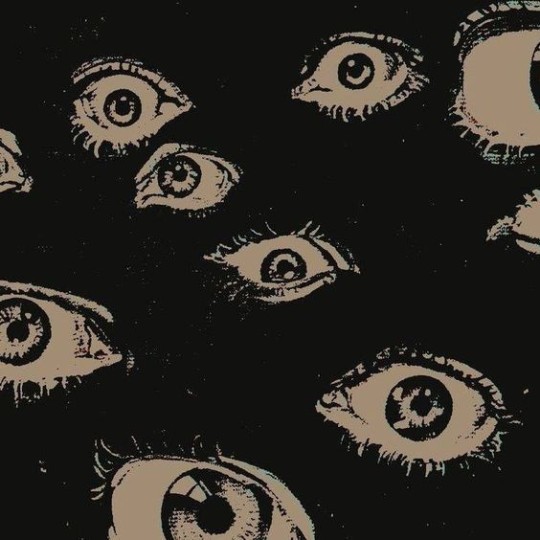

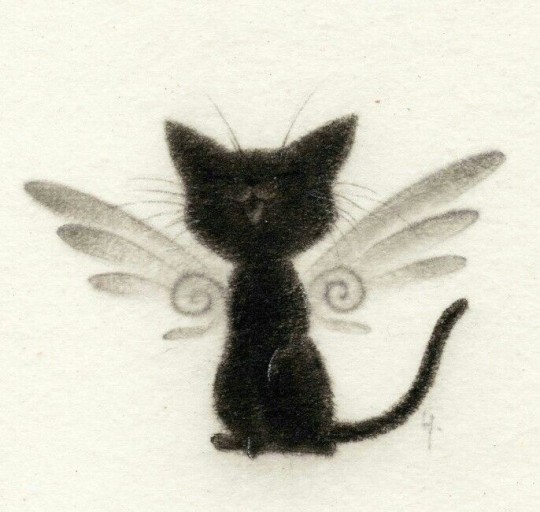

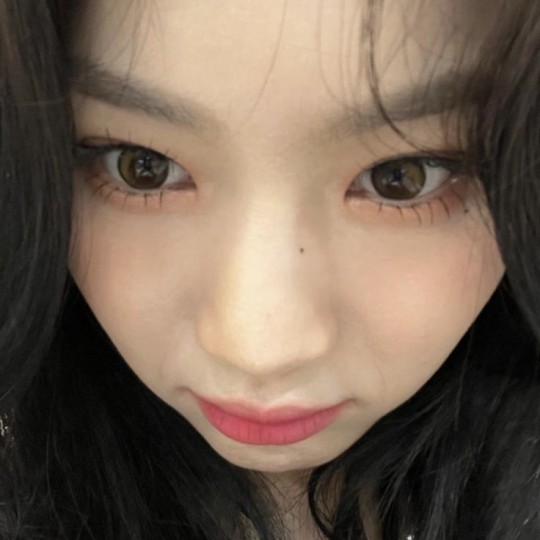

i got my eyes on you ... 👀
#kpop girls#kpop headers#kpop icons#kpop layouts#kpop wallpaper#lana del ray moodboard#lana del bae#lana del gay#lana del ray aka lizzy grant#lana del rey#isaac hanson#isaac.txt#i say things#isa stayc#stayc updates#stay hydrated#stay curious#kpop edits#kpop#kpop moodboard#kpo#kpop stayc#twice smut#skz jeongin#bts suga#bts layouts#bts army#bts v#bts fanfic#black and white
36 notes
·
View notes
Text

Inspired by Haunted Cosmos podcast.
#stay curious#keep a ready sword#Bible#photography#coffee#original photography#original photographers#photographers on tumblr#letter board#book photography#books#Haunted Cosmos
6 notes
·
View notes
Note
I have a question. in choir one time one of the altos was looking at another alto and she made a V with her fingers and sticked her tongue through it I was so confused because they were laughing and I didn't know the meaning of it i still don't know what it means?
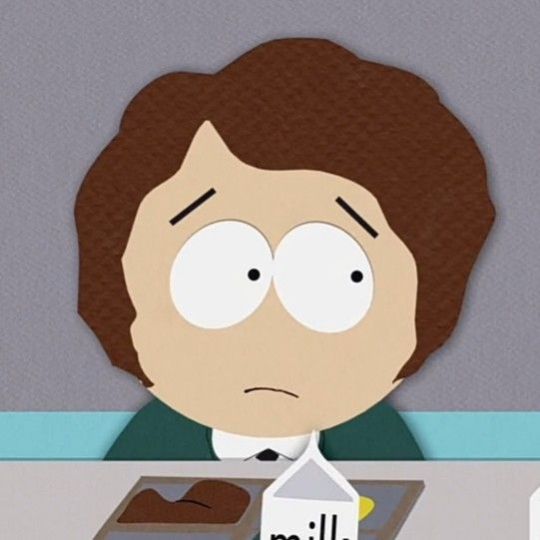
(I'm not using their names for their privacy )
Dude its...
Its a s3x thing-
4 notes
·
View notes
Text


watching the pretty moths in the grass my friend insisted on taking pictures
#nature#grass#pose#outdoors#pretty#stay curious#aununa#timeless#vintage#universal#diversity#we are all the one#kindness
4 notes
·
View notes
Text
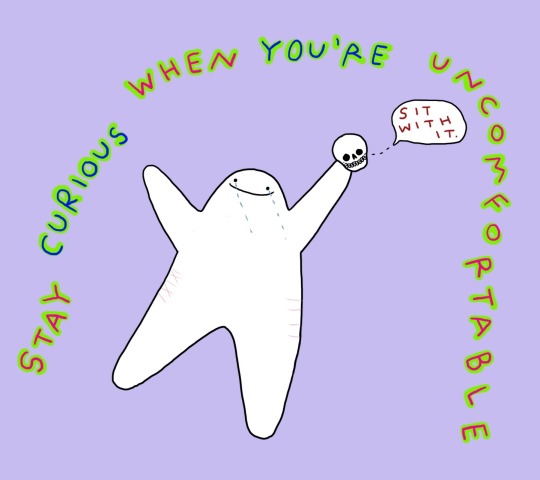
#stay curious#eating disorder recovery#sit with it#ed recovery#doodles#bad art#lousy drawings#doodle#positivity#self love#healing#recovery
135 notes
·
View notes
Note
Hey I'm curious, if you did get back into academia what would you go for? Would you go back for multiple things if you could?
The timing of this ask couldn't have been better; I just got home from the library a few minutes ago, and my selection is a pretty good indicator of my current academic interests:
Shark Trouble, Peter Benchley (nonfiction)
The Math Book (Big Ideas Simply Explained series)
Astronomy for Dummies, Feinberg
The Wave: In Pursuit of Rogues, Freaks, and Giants of the Ocean, Susan Casey
Easy Algebra Step-By-Step, 2nd ed., McCune & Clark
I've almost finished Carl Sagan's Billions and Billions, which I've been reading piecemeal since February (it's a good supplement to his extremely enjoyable Cosmos series), and of course a rampaging monster novel for pure entertainment. 😆
The math books are to brush up on my algebra skills in anticipation of learning calculus (guided self-learning), and I have a deep (ha) and abiding love for the ocean and sharks. I'd originally intended to check out some amateur radio books—I'm a Level 1 Technician but I let my license lapse and need a refresher to renew—but there were none to be found. I'll look again later.
But to answer your question, if time and money were no object, I'd go back to school for multiple things—and probably end up a lifelong scholar. I'd work on earning my Masters in English or Creative Writing first (I have an Associate's in the former), maybe even a PhD (oh, to be Dr. Hal Bender!) and take more language classes, too. A degree in Art and/or Illustration would be agreeable to me as well. Wouldn't mind getting back into symphony either, though I probably wouldn't study music formally. Same with Film; I learned more about storytelling from a film class than I did in any lit class I've taken.
The arts are my most developed skill set, but I love the sciences, particularly oceanography, geology, GIS, and computers. I've only recently taken a keener interest in astronomy (thanks, Carl), though I don't see myself ever getting a degree in it. (Unless?)
TL;DR, I just want to live in a university and learn and write stuff and make art and travel the oceans and understand how everything works. Become wise as well as knowledgeable. I'm glad I've got a library to help me work on achieving that.
#ask bender#academia#goals and aspirations#continuing education#adult learning#support libraries#stay curious#carl sagan#<- this guy singlehandedly rekindled my desire to continue my education#even if i don't do it in a university. i can still read and keep learning
2 notes
·
View notes
Text
Embracing Change: Navigating Life's Twists and Turns
Hey there, fellow adventurers! Today, I want to chat about something that's been on my mind lately: change. Yep, that's right, that inevitable force that swoops into our lives, often uninvited, and shakes things up like a snow globe. But you know what? Change isn't always the villain in our stories; sometimes, it's the hero we never knew we needed.
Let's face it, change can be scary. Whether it's a new job, a breakup, moving to a different city, or even just the passage of time, change has this way of making us feel like we're standing on shaky ground. We get comfortable in our routines, cozy in our habits, and then BAM! Change comes knocking, throwing everything into disarray.
But here's the thing: change is also an opportunity for growth. It's a chance to shed old skin, spread our wings, and soar to new heights. Sure, it might be uncomfortable at first, like trying to break in a new pair of shoes, but eventually, we find our stride and realize that change isn't so scary after all.
So, how do we embrace change and make the most of it? Well, for starters, we can adopt a mindset of curiosity and openness. Instead of viewing change as something to be feared, we can approach it with a sense of wonder, eager to see where the road may lead.
Another helpful strategy is to focus on what we can control. While we may not be able to stop the tide of change from rolling in, we can choose how we respond to it. We can take proactive steps to adapt and thrive in the face of uncertainty, whether that means learning new skills, seeking support from friends and loved ones, or simply practicing self-care.
Of course, it's also important to remember that change is a process, not an event. It takes time to adjust to new circumstances and find our footing once again. So, be patient with yourself and give yourself grace as you navigate the twists and turns of life's ever-changing landscape.
As we embark on this journey of embracing change, let's remember to support one another along the way. After all, we're all in this together, navigating the highs and lows of life side by side. So, reach out to a friend, lend a listening ear, and let's cheer each other on as we embrace the beautiful, messy, unpredictable adventure that is life.
And hey, if you're feeling overwhelmed by change right now, just remember: this too shall pass. You're stronger and more resilient than you realize, and you've got a whole community of fellow adventurers cheering you on every step of the way.
#EmbraceChange #LifeJourney #GrowthMindset #AdventureAwaits #SelfDiscovery #SupportEachOther #StayCurious #Mindfulness #SelfCare #StayStrong #Community #Positivity #KeepMovingForward #YouGotThis #TumbleThroughLife

#embracechange#life journey#growth mindset#adventure awaits#self discovery#support each other#stay curious#mindfulness#self care#stay strong#community#positivity#keep moving forward#you got this
2 notes
·
View notes
Text
The Prince stands as a pivotal yet controversial masterpiece in Western literature. Its true nature sparks endless debate: is it a biting satire or, as Bertrand Russell suggests, “a handbook for gangsters”? The true intent of Machiavelli remains shrouded in mystery. However, its enduring legacy is clear: a profound exploration of the lengths to which some will go to acquire and retain power.
Born on May 3, 1469, in Florence, Italy, Niccolò Machiavelli emerged during a period marked by the division of Italy into four competing city-states, leaving the region vulnerable to Europe’s more dominant powers.
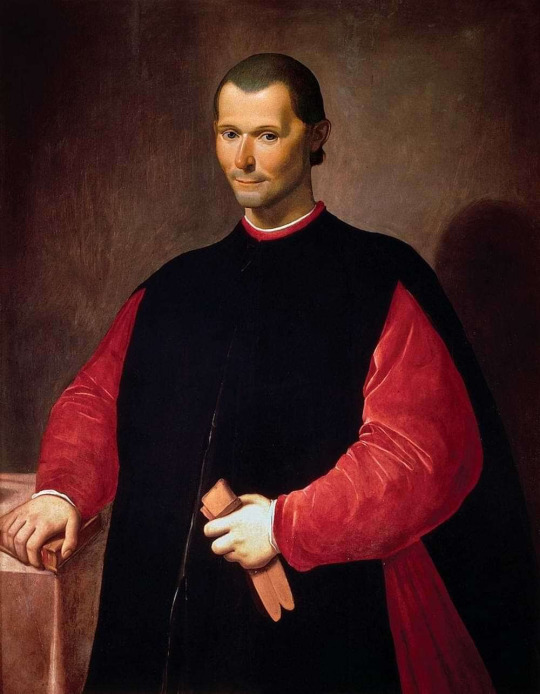
Portrait of Niccolò Machiavelli by Santi di Tito, c. 1550–1600
Witnessing the rapid ascent and downfall of leaders, Machiavelli pinpointed traits he deemed crucial for acquiring and sustaining power. His groundbreaking book diverged from idealized views of leadership, instead detailing the actual strategies of the powerful. The ends, he asserted, always justify the means, no matter how harsh, deceitful, or unethical.
Prior to Machiavelli, political philosophers generally viewed good leadership as embodying humility, morality, and honesty. Machiavelli challenged this, bluntly stating, “It is better to be feared than loved, if you cannot have both.” His depiction of a successful ruler was not the noble prince of fairy tales, but a figure who could be brutal, manipulative, and immoral when needed.
According to Machiavelli, leaders must hide their true intentions, strive for consistency, and, at times, act “against mercy, against faith, against humanity, against frankness, against religion,” all in the pursuit of preserving the state. He also stressed the importance of appearing moral, even when not being so, to maintain public image. In his words, “A prince must always seem to be very moral, even if he is not.”❝
Everyone sees what you appear to be, few experience what you really are. Niccolò Machiavelli
Arguing for the effectiveness of cruelty over kindness in certain situations, he explained, “Making an example of one or two offenders is kinder than being too compassionate, and allowing disorders to develop into murder and chaos which affects the whole community.” Furthermore, Machiavelli cautioned that keeping one’s word could be dangerous, as “experience shows that those who do not keep their word get the better of those who do.”
On the topic of destiny, Machiavelli urged leaders not to rely on luck but to actively shape their fortunes through charisma, cunning, and strength. He saw life as governed by two key elements: fortune and virtù, with virtù representing bravery, power, and the exertion of will. In his perspective, an effective leader maximizes virtù and minimizes dependence on fortune, embodying the principle that “fortune favors the brave.”❝
Never attempt to win by force what can be won by deception. Niccolò Machiavelli, The Prince
Cesare Borgia, a ruthless and shrewd prince of the Papal States, was a key inspiration for Machiavelli’s The Prince. Machiavelli personally observed Borgia during a visit to discuss Florentine relations, where Borgia cunningly assassinated his enemies after luring them with gifts and false promises of friendship. Machiavelli saw Borgia’s decisive leadership as a model for what Florence needed to rejuvenate its morale, unify its people, and restore its historic prominence.

Front cover of the 1550 edition of The Prince
The Prince was eventually published in 1532, five years after Machiavelli’s death, sparking a mix of outrage and admiration over the following centuries. This positioned Machiavelli as a revolutionary, albeit controversial, political thinker. By 1559, the Catholic Church had listed all his works on its Index of Prohibited Books.
Yet, some saw the book as a candid reflection of actual statecraft. 18th-century philosopher Jean-Jacques Rousseau believed Machiavelli was exposing, rather than celebrating, the misuse of power, calling him “an honest man and a good citizen.”
Machiavelli’s influence was far-reaching. He was blamed for inspiring Henry VIII’s defiance against the Pope and his seizure of religious authority. William Shakespeare referred to him as “the murderous Machiavel” in Henry VI, with many Shakespearean characters displaying Machiavellian traits. In the 20th century, Machiavelli’s ideas were linked to dictators like Adolf Hitler, who kept a copy of The Prince by his bedside, and Joseph Stalin, who was known to have read and annotated his own copy.
Tomorrow, get ready to be swept away by the invisible force that shapes our world, whispers through the trees, and dances with the leaves. Stay curious!
Support Curious Peoples
If you’re a fan of Curious Peoples, your support on Patreon can can make a big difference. Help us continue to feed your curiosity with more amazing episodes.Support us on Patreon
Editors’ finds
Rewind: Printing Press: The Information Revolution
Delve: The Prince by Niccolò Machiavelli
Read: 8 Most Brutal Dictators in History
Explore: Crime Rate by Country 2023
Words of wisdom
“The first method for estimating the intelligence of a ruler is to look at the men he has around him.” —Niccolò Machiavelli
“Never was anything great achieved without danger.” —Niccolo Machiavelli
“Men are driven by two principal impulses, either by love or by fear.” —Niccolò Machiavelli
“Everyone who wants to know what will happen ought to examine what has happened: everything in this world in any epoch has their replicas in antiquity.” —Niccolò Machiavelli
How did you like the episode?
Love it | It's OK | Meh, do better
Spread the Curiosity

Update your email preferences or unsubscribe here
© 2023 Curious Peoples, 2023
Calcada da Estrela 215
Lisbon, Lisbon 1200-663, PortugalPowered by beehiiv
Remind you of someone? Clue, he has small hands and orange skin
2 notes
·
View notes
Text
I used to babysit a kid who was having a really hard time with The Rules -relatable. He had a rough past and a lot of energy and ADHD. but he was slowly gaining confidence in a loving and supportive (queer) home.
We went to the aquarium and he was trying to go into an employee only door. and it's my job to redirect, so I started to, when a scientist who worked at the museum emerged.
Most grown ups, when they see a kid trying to investigate something like an employees only door, would want to keep the kid away, even be unkind and/or annoyed. Many would see this kid as "misbehaving"
but this guy was a scientist, a science educator, working in a museum. And he saw - a young scientist. A curious kid investigating and testing his environment. He saw, with appreciation and admiration, a kid brimming with curiosity about the world and determination.
And he rewarded and encouraged that curiosity.
He opened the door and gave me and the kid a personal tour of this employee-only, research facility within the aquarium. The kid got to explore and ask questions in this place most people never got to see.
That scientist taught us both something important that day. I will always remember and appreciate it, and Im sure so will that kid (who has moved to another state and seems to be thriving). I made sure to reinforce the lesson and tell the kid that what happened was special- most people don't get a personal tour behind the scenes at the aquarium, he got to do that because he was curious and exploring, just being himself.
#ADHD#parenting#science education#childcare#stay curious#break rules#take chances#make mistakes#get messy#storytime
5 notes
·
View notes
Text
Daily reminder to stay curious!
Don't trust the links or posts.. just don't search it up. I know you want to but don't :D /srs
#anime#alive fandom#fandom#stay curious#stay safe#bnha fandom#black butler#dont look up#demon slayer#demon slayer fandom#yes im talking about demon slayer fandom#I know what yall post on tt#kny manga#kny fandom#kny fanfic#don't trust kny fandom on tt#tw!
3 notes
·
View notes
Text
Daily Quotes
The world is full of magical things patiently waiting for our wits to grow sharper
2 notes
·
View notes
Text
Would Mabel be able to afford a Human-Sized Hamster Ball?
Introduction
Okay, so I was re-watching Gravity Falls when I came across this image from season 1 episode 2 (The Legend of the Gobblewonker):
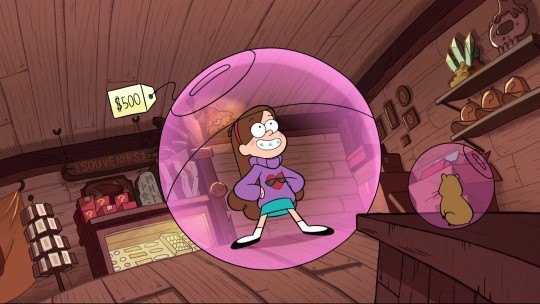
And while I know this was all in Mabel’s head, this autistic nerd couldn’t help but ponder the following question:
“Would Mabel actually be able to afford a human-sized hamster ball with only 500 USD?”
So, I decided to go find a hamster ball being sold online, and I found this one being sold from China:

At first, it seemed within Mabel’s budget since it says 400 USD, but then I realized that Mabel would also have to take into account the shipping fee. And this is where the mathematics comes in . . . keep in mind that this post may be long, so if you’re not ready to handle the math, then feel free to find a different Tumblr post to read! :)
Outline of The Plan

According to this top result from Google, shipping via air freight would cost from 4 USD to 8 USD per kg. We’ll be using the lower bound of $4 per kilogram. But, how will we figure out the mass in kilograms?
Well, recall this physics formula:
Density = Mass / Volume
Solving for Mass gives us:
Mass = Density × Volume
So, if we knew the density of the material the ball is made of, along with the volume of the material used to make it, then we can just multiply them to get our mass. And since this image tell us the dimensions of the material (2.5 m diameter and 1mm thickness) along with the type of material used (PVC), we have almost all the information we need:

The only other information we need is the density of the PVC used, which is probably the apparently cost-effective Rigid PVC at a minimum density of 1.3 grams per cubic centimeter.

Now, given all of this, let’s look at the calculations . . .
The Actual Calculations!

Okay, so that looks like a lot. But, let’s go through it step by step . . .
The material is really the difference of two spherical volumes. The larger sphere has diameter 2.5 meters, and thus a radius of 1.25 meters
The smaller sphere has a radius 1 mm less than the larger one, since 1 mm is the thickness. And thus, the smaller sphere’s radius is:
Smaller Radius = 1.25 meters - 0.001 meters = 1.249 meters
The Volume of any Sphere is computed by this formula:

So, the orange bit simply subtracts the formulas for the volumes of each sphere, and substitutes the given radii. This gives us about 0.01961925 cubic meters, or converting to cubic centimeters, about 19619.25 cm^3 of plastic.
Since the density of the plastic is 1.3 grams/cm^3 (shown in maroon), this gives us about 25505 grams of mass or about 25.5 kilograms of plastic (shown in blue).
Finally, in brown, we see that even if shipping was $4 per kilogram, the shipping fee would be at least $102.
This would give us a minimum total cost of $400 + $102 shipping = $502 for the ball . . . sorry, Mabel! Even if you and Dipper did win the photo contest and split the $1000 prize evenly, you may have needed to borrow from his share! :)
Also, here’s a medal for the readers who stuck around all the way to the end: 🏅
As always, remember to stay curious! :)
#stay curious#mathblr#mathsblr#math is fun#mathsisfun#gravity falls#gravity falls theory#autistic rambling
6 notes
·
View notes
Text
The "Huh" Moment: Stay Curious My Friends
It's unbelievable how much information must be sorted through to get to the bottom of anything that matters. And if you're only getting information from people you agree with on everything, you're gonna miss something.
Heterodox media is the closest thing you can go to for a reliable presentation or discussions on social and political events, in the sense that you're getting at least two or more perspectives that are respectful and gracious to one another but don't necessarily end in agreement or resolution but let the viewers decide which take or which elements of their takes resonstes most clearly.
If you're not suspicious of everyone and anyone committed to towing the line of establishment, political, social/soft science academia, or religious ideology that's likely because you're elbow deep in zealotry yourself. Or you don't recognize your "truth" to be what it is, an ideology. Probably both.
For me there's something exhilarating about coming across information or an insight which leads to realizing you were wrong about something. A "huh" moment that leads to the "Eureka" moment is arguably the moment that matters most.
To refuse the impulse to recoil, or look away, in that moment is fundamental to growth. It means your capable of being objective, and that getting it right is more important to you than being right. Generally speaking there's something to be said about the utility of unsatisfied, proactively curious agnosticism particularly when approaching unfamiliar or novel subject matter.
We all have the capacity to become, or follow the lead of, someone who initiates or engages in the horrific, none more so than those with good intentions and/or dedicated and in love with being right.
The value of good intentions, is indecipherable, but it's somewhere south of less than nothing because most of the monsters throughout history in real life that engaged in the horrific didn't see themselves as Disney villains - they believed they were right, that doing the right thing was the only option, and there were no limits to the ends which justified the means.
#the huh moment#huh moment#eureka moment#heterodox media#echo chamber#ideology#philosophy#just my thoughts#shower thoughts#writing#only the curious#only the curious have something to find#stay curious#proactively curious agnosticism
3 notes
·
View notes